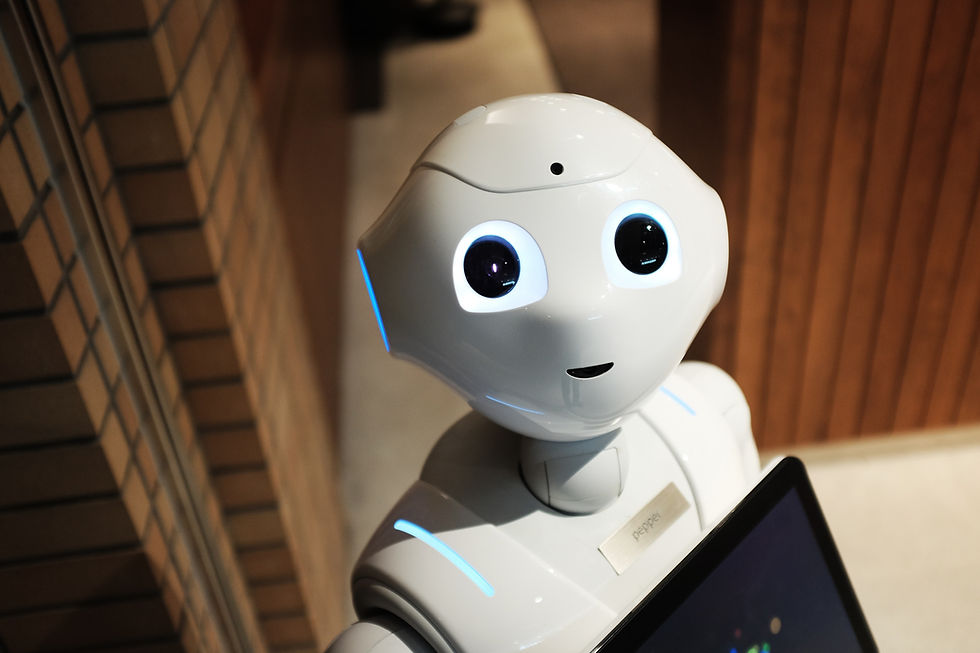“The Great White Collar Migration”: How AI Will Make Millions of “Good Jobs” Obsolete
- Abby Jaxon

- May 5, 2023
- 4 min read
Updated: May 15, 2023
In a break from our normal music industry focused content, ADAM 4 Artists felt like now is a great time to switch gears and examine some very interesting, and frankly, scary observations about the state of technology, jobs and the ever present shadow of AI... a subject that appears to be the only topic everyone is discussing. How AI will make millions of “Good Jobs” obsolete...

Let's get right to the point... Employees at Fortune 500 companies need to come to terms with the fact that, over the next 3 - 5 years, 50% of the personnel currently filling certain roles could become obsolete. Similar to the great career migrations that the automotive and many other blue collar jobs witnessed between the 80’s and 2000’s, as a result of machinery and robotics, an even greater migration could be coming to office, aka "white collar", jobs.
Some reductions may be clear and immediately recognizable, others, on the other hand, are not quite so obvious and may, relatively speaking, take longer to occur. Here is a list of corporate roles that will likely see a significant reduction in human labor by 2029:
Legal
Marketing
Accounting
Customer Service
Administration (clerical & sales support)
Human Resources
Sales
Tech Support
Training
R&D
We predict that over the next 2 years, AI will learn to perform all of the aforementioned job functions more efficiently, productively and, ultimately, cheaper than humans. For most large companies there will be an additional 1 - 3 year integration period where leadership assesses how, when and where to best deploy AI into the organizational workflow; coupled with the a physical act of deployment.

For context, consider that companies in the 90’s had to determine how to best integrate software from the likes of Microsoft. Then again in the 2000s, with software from companies like Salesforce. And, most recently, as a result of the pandemic, with the introduction of Zoom. With each tech advancement, the adoption has been faster, more disruptive and more impactful. As an aside, Walmart recently disclosed (April 2023) that 65% of its stores and a majority of its fulfillment centers will be automated within the next 5 years, news that came on the heels of 2000 layoffs at its fulfillment centers; a move likely motivated by the growth of automation.
The introduction of AI will be much broader, more disruptive and much more impactful than any of the aforementioned events. America is fully entrenched as a service based economy and any sufficiently advanced technology will replace those supporting said services en masse.

Adding to the sheer weight of the above assumptions is the very recent announcement of the departure of Google's Head of AI (5/3/23). In announcing his motivation, he stated a "hells basket" of reasons, including human obsolescence, war, misinformation and ethics.
Here's the thing; AI may not be inherently "bad", just like a car isn't "bad"; until a human decides to drive one into a crowd of people, operate one while intoxicated or the fact that their invention ultimately put horse salespeople out of business. Therefore, once the technology is mature enough for businesses to replace human employees, it is safe to say that any moral or altruistic imperative to retain human capital will invariably fold under the weight of the profit motive and competition. Facts made even more likely when one considers the current and probable future financial environment.
We are entering a future where top line growth continues to slow, resulting in an aggressive need for cost savings. Currently, this is a direct result of US inflation and an aggressive rise in interest rates. Global macroeconomic pressures, however, will kick in. For example, America’s ability to buy cheaply on the global energy markets will be impacted by the decision of many resource-rich nations to stop settling global trades using the the US dollar.
The next wave of layoffs will doubtlessly result in a permanent reduction in the national workforce. Then, as companies seize on the opportunity to replace human with AI, will usher forth a transition that, once started, will begin a cascade that will never return to the old normal.

Is all hope lost? No. New roles will rise to replace those that will become obsolete as a result of the great white collar migration. But many former employees will lack the skills needed to fulfil these new roles and will be forced into an ever shrinking "legacy" labor market; thus having to compete with more people in a continuously evaporating labor pool. Now is a great time to consider what skills will be useful and "termination-proof" over the next decade.
If you're a musician (which... we are a music blog... so hopefully that's everyone), we know that the rise in AI music is concerning, but there is a backlash from the leaders in the industry, including labels, streaming platforms and more, against the technology's sudden rise. So it is best to examine how AI can become part of the creative workflow. The fact is, human-made art will always be considered the gold standard, so concentrate on ways to include the best qualities of AI, while ensuring the authenticity and humanistic qualities of the content being created.
Hopefully this article was enlightening, even if it was a little doomy & gloomy. It can't be helped. Change IS COMING. For musicians needing help navigating this ever changing landscape, tap in with ADAM 4 Artists. Having "motion" is a process and A4A can help you get there!





Comments